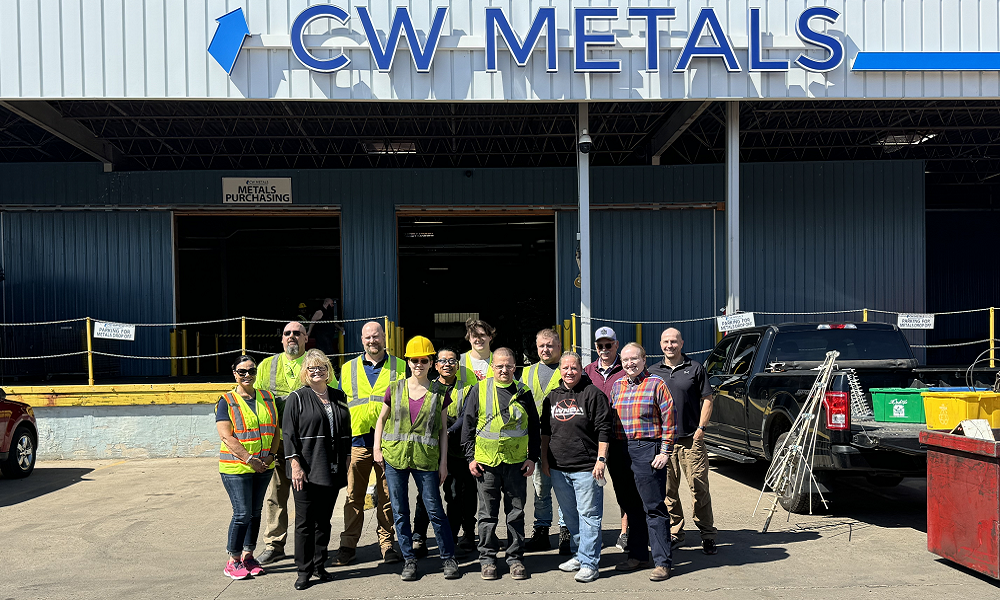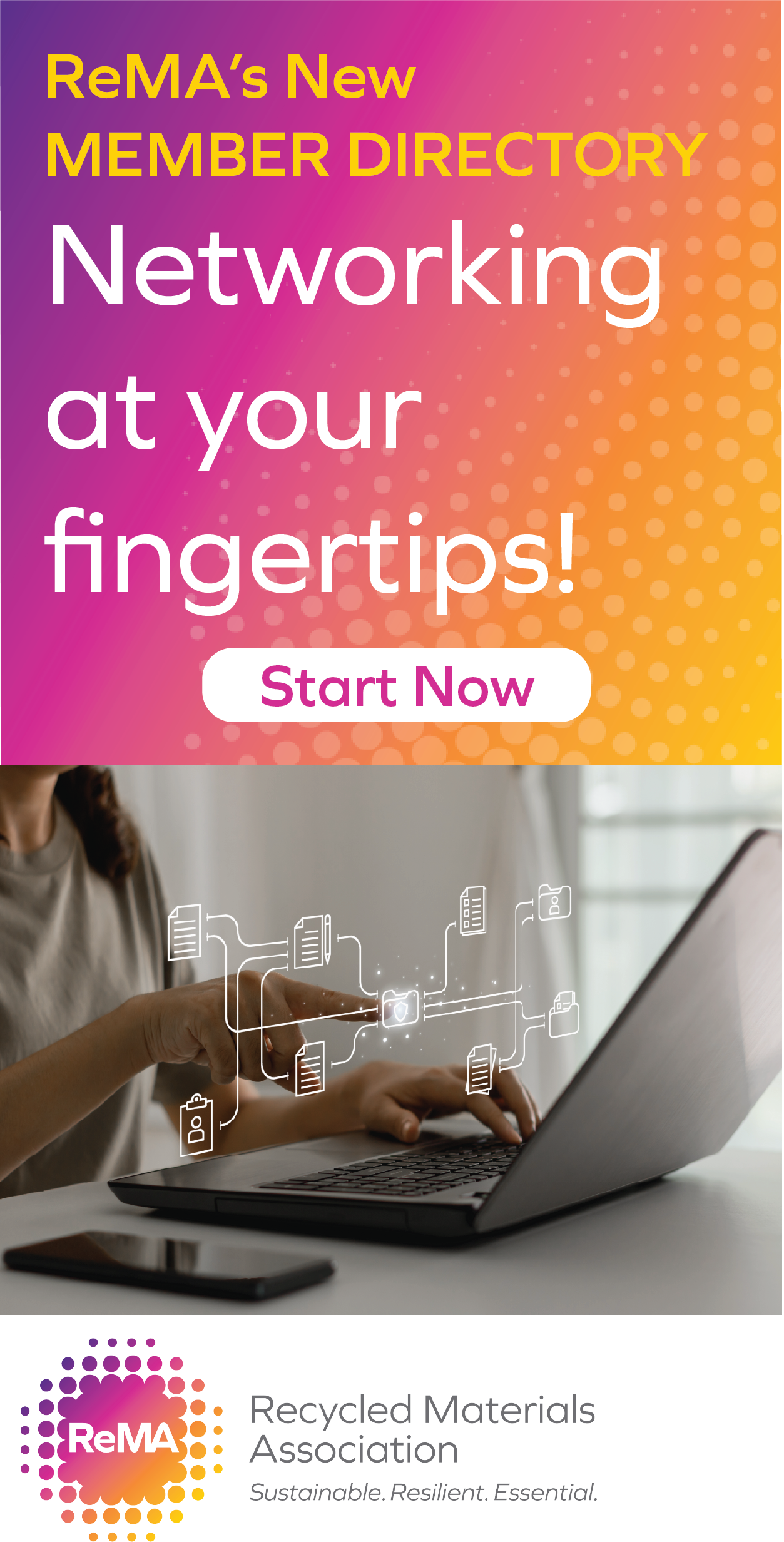On Wednesday, Sept. 4, CW Metals held a celebratory lunch to recognize three months of success, six new hires, and a positive shift in company culture after joining the Recycled Materials Association’s (ReMA) Inclusion Cohort pilot. Attendees included CW Metals employees, community partners they worked with in hiring, as well as the consulting team from James Emmett & Company (JEC) and Opportunity Enterprises.
Like most manufacturing companies in a tight labor market, it can be challenging for ReMA members to find qualified employees. The Inclusion Cohort supports ReMA members in tapping into a population that faces much higher unemployment rates than average: adults with disabilities. The program provides members with training on hiring and retaining an inclusive workforce, and then connects the members with individual candidates that are qualified for roles they are looking to fill.
Four ReMA companies signed onto the pilot program: CW Metals, Charleston Steel, Allied Alloys, and Ferrous Processing and Trading. Cohort members gain access to monthly meetings to share lessons learned with one another and to receive specialized ongoing training.
Neil Byce, co-owner of CW Metals and ReMA Vice Chair, and Crystal Palmer, CFO of CW Metals, learned about the pilot program from a ReMA board meeting in the Fall of 2023.
 “I remember looking at Neil during the meeting and he said to me ‘I think we can do this at CW Metals,’” Palmer recalled. “We were put in touch with Katheleen Parks, senior director of employment services and transition at Opportunity Enterprises, and the folks from JEC who followed up with phone calls and meetings so we could understand the opportunity.”
“I remember looking at Neil during the meeting and he said to me ‘I think we can do this at CW Metals,’” Palmer recalled. “We were put in touch with Katheleen Parks, senior director of employment services and transition at Opportunity Enterprises, and the folks from JEC who followed up with phone calls and meetings so we could understand the opportunity.”
Opportunity Enterprises and JEC toured CW Metals’ facility and analyzed its workflow, safety, and culture to get a sense of the company’s needs and candidates that would be a good fit.
“It was clear that Kathleen and the team at JEC knew their workforce,” Palmer said. “It was clear from the way they analyzed our business to helping us set expectations for the pilot, to setting up interviews and facilitating job coaches for the new hires.”
Parks also provided current CW Metals staff with training to educate them about working with people with known disabilities.
“We can provide training to employees, but it’s really about training businesses to be ready to work alongside this amazing untapped workforce,” Parks said. “So, we got CW Metals ready and JEC found the candidates and an organization in the community who could support the new hires.”
By participating in the program, CW Metals gained strong new hires and a better understanding of how to work with people with different abilities. They were also able to do additional sorting on certain commodities with their newly hired talents’ skills, leading to increased revenue.
“This program has been a win all around,” said Jeremy Vang, human resources manager at CW Metals. “It’s been great for the company, we know that the new employees have found meaningful employment where they can make a positive impact on the world, and it’s been a good experience for the rest of our staff.”
A Supportive Environment
According to Vang, having supportive team leaders, including management and ownership, has been key to making the inclusion cohort a success.
“You want people from all levels of your company,” he said. “From ownership to the frontline supervisor, you need people pulling on the rope with you and who are aligned with your objectives.”
 Since its introduction, CW Metals has seen the positive impact of having an inclusive workforce. New hires have told Vang that they are not only grateful for the opportunity but also excited to be part of the industry.
Since its introduction, CW Metals has seen the positive impact of having an inclusive workforce. New hires have told Vang that they are not only grateful for the opportunity but also excited to be part of the industry.
“We have a young woman who has taken the leading position on our shaker table. She’s developed a genuine curiosity for the metal commodities,” Vang said. “When we had our celebration of the pilot, she gave us a tour of her workspace and was teaching me about different commodities and brasses.”
According to Vang, the new employees’ positivity has rubbed off on the rest of the team.
“This group is showing up on time or even early; they’re excited to be here” he said. “That kind of behavior can be contagious.”
For a program like this to thrive, it’s important to make inclusivity intentional.
Breaking Biases
For other recyclers who want to participate in this pilot, Parks recommends focusing on a potential hire’s skillset rather than trying to have them meet every part of a job description.
“When you look at skillsets, you can evaluate your workforce as a whole and move them into positions by their skills and where they are going to be top performers and feel fulfilled,” she said.
 According to Bill Emmett, executive director of talent acquisition, DEI at JEC, a successful inclusion program requires a cooperative relationship between company and the community organizations that find the recruits.
According to Bill Emmett, executive director of talent acquisition, DEI at JEC, a successful inclusion program requires a cooperative relationship between company and the community organizations that find the recruits.
“The company provides opportunities and open arms while the community organizations provide great candidates who could be a good match for the company,” he said.
Vang emphasized the importance of being open to the process and recognizing that everyone is grappling with different abilities and struggles.
“People with a disability may have a physical impairment or may be diagnosed with a neurological disorder,” he said. “Work with organizations that can help you broaden your perspective.”
Members interested in joining in the Inclusion Cohort can reach out to ReMA’s Natalie Betts at nbetts@recycledmaterials.org.
Photos Courtesy of CW Metals.










